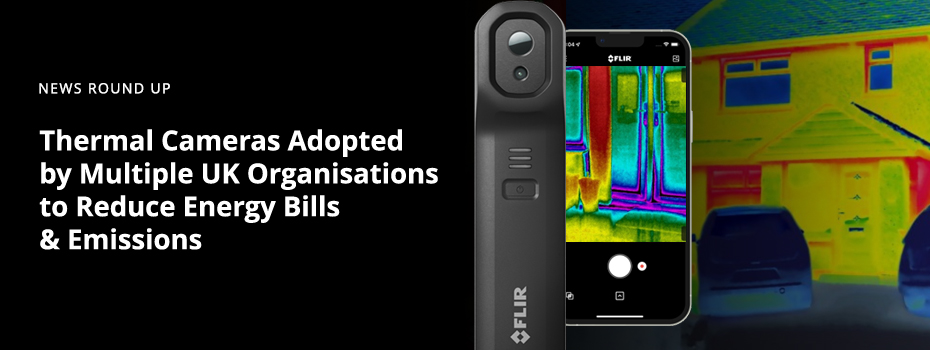 Rising energy prices and environmental urgency have inspired charities, councils, and companies across the UK to look for innovative methods of maximising the efficiency of British homes. One such method is thermal imaging. In 2022, we brought you multiple reports of organisations, including the charity Cambridge Carbon Footprint; South Somerset District Council; and Octopus Energy, providing thermal cameras to property owners for the purpose of identifying heat loss. Armed with this information, householders could target their insulation efforts effectively. Subsequently reducing their energy consumption, bills, and emissions. 2023 has seen even more councils and organisations adopt similar policies. Below are just a few instances that made headlines.
Continue reading →
Rising energy prices and environmental urgency have inspired charities, councils, and companies across the UK to look for innovative methods of maximising the efficiency of British homes. One such method is thermal imaging. In 2022, we brought you multiple reports of organisations, including the charity Cambridge Carbon Footprint; South Somerset District Council; and Octopus Energy, providing thermal cameras to property owners for the purpose of identifying heat loss. Armed with this information, householders could target their insulation efforts effectively. Subsequently reducing their energy consumption, bills, and emissions. 2023 has seen even more councils and organisations adopt similar policies. Below are just a few instances that made headlines.
Continue reading →Thermal imaging
-
News Roundup: Thermal Cameras Adopted by Multiple UK Organisations to Reduce Energy Bills & Emissions
 Rising energy prices and environmental urgency have inspired charities, councils, and companies across the UK to look for innovative methods of maximising the efficiency of British homes. One such method is thermal imaging. In 2022, we brought you multiple reports of organisations, including the charity Cambridge Carbon Footprint; South Somerset District Council; and Octopus Energy, providing thermal cameras to property owners for the purpose of identifying heat loss. Armed with this information, householders could target their insulation efforts effectively. Subsequently reducing their energy consumption, bills, and emissions. 2023 has seen even more councils and organisations adopt similar policies. Below are just a few instances that made headlines.
Continue reading →
Rising energy prices and environmental urgency have inspired charities, councils, and companies across the UK to look for innovative methods of maximising the efficiency of British homes. One such method is thermal imaging. In 2022, we brought you multiple reports of organisations, including the charity Cambridge Carbon Footprint; South Somerset District Council; and Octopus Energy, providing thermal cameras to property owners for the purpose of identifying heat loss. Armed with this information, householders could target their insulation efforts effectively. Subsequently reducing their energy consumption, bills, and emissions. 2023 has seen even more councils and organisations adopt similar policies. Below are just a few instances that made headlines.
Continue reading → -
Thermal Trade In: Swap Your Old Thermal Camera for the Latest Technology
 This autumn and winter we're offering you the chance to trade in your old thermal camera in exchange for money off a new Teledyne FLIR model! We understand that many of you already have a trusted thermal camera, but you shouldn't have to miss out on the exciting opportunity to upgrade. That's why we've launched our exclusive Thermal Trade-In promotion.
Continue reading →
This autumn and winter we're offering you the chance to trade in your old thermal camera in exchange for money off a new Teledyne FLIR model! We understand that many of you already have a trusted thermal camera, but you shouldn't have to miss out on the exciting opportunity to upgrade. That's why we've launched our exclusive Thermal Trade-In promotion.
Continue reading → -
Defending Data Centres Using Teledyne FLIR Thermal Imaging
 As we come to rely on the internet,
data networks, AI, and cloud-based systems more and more, it’ll become
increasingly important to ensure the reliability and efficacy of data centres. Unplanned
downtime can be very costly both with respect to loss of earnings and business
reputation. A Teledyne FLIR case study estimates that data centre companies
lose $8000 every minute a plant is down due to an unexpected failure.[1]
Spotting potential issues before they become catastrophic faults could eliminate
unplanned downtime. Understanding this, Teledyne FLIR offers a range of thermal
imaging solutions specifically for this purpose.
Continue reading →
As we come to rely on the internet,
data networks, AI, and cloud-based systems more and more, it’ll become
increasingly important to ensure the reliability and efficacy of data centres. Unplanned
downtime can be very costly both with respect to loss of earnings and business
reputation. A Teledyne FLIR case study estimates that data centre companies
lose $8000 every minute a plant is down due to an unexpected failure.[1]
Spotting potential issues before they become catastrophic faults could eliminate
unplanned downtime. Understanding this, Teledyne FLIR offers a range of thermal
imaging solutions specifically for this purpose.
Continue reading → -
Thermal Imaging Cameras Integral in the Latest Hunt for Nessie
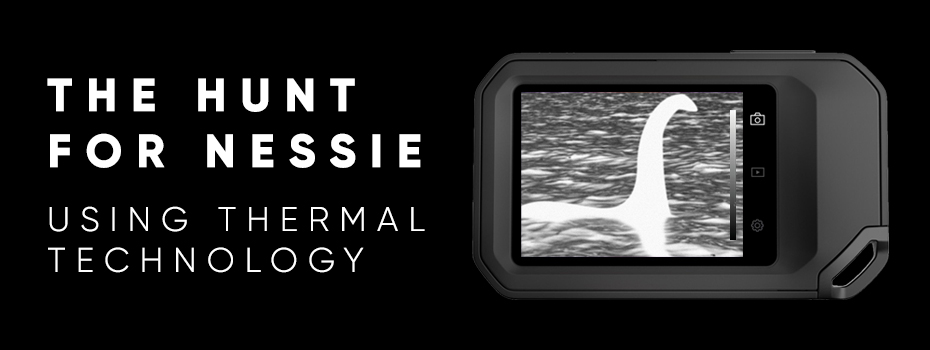 August 2023 saw the biggest hunt for the legendary Loch Ness Monster in fifty years. Scores of enthusiasts flooded Inverness in the hopes of catching a glimpse of the long-mythologised Nessie. Stories about the cryptid have circulated for centuries but, to date, nobody has captured an undisputed image of the beast. Nevertheless, fans remained undeterred, hoping that the latest advances in thermal imaging technology would give them the edge.[1]
Continue reading →
August 2023 saw the biggest hunt for the legendary Loch Ness Monster in fifty years. Scores of enthusiasts flooded Inverness in the hopes of catching a glimpse of the long-mythologised Nessie. Stories about the cryptid have circulated for centuries but, to date, nobody has captured an undisputed image of the beast. Nevertheless, fans remained undeterred, hoping that the latest advances in thermal imaging technology would give them the edge.[1]
Continue reading → -
Working in Explosive Locations with the Teledyne FLIR Cx5 Hazardous Area Thermal Camera
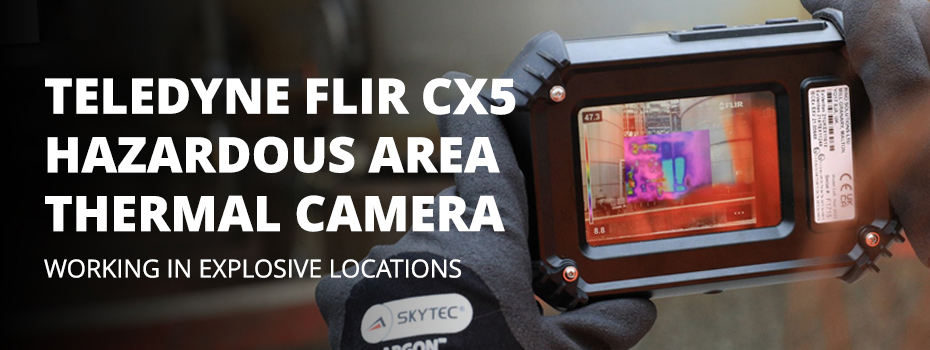 Explosions in hazardous areas are extremely costly. They endanger invaluable lives and can result in damage totalling hundreds of millions of pounds. Explosions occur when volatile gasses or dust in the atmosphere reach ignition temperature. According to conservative estimates, a major dust explosion takes place somewhere around the globe every 2.9 days! Predictive maintenance routines that include regular T-class temperature checks are an effective method of preventing such catastrophes. However, as suggested by their name, hazardous locations are dangerous. Therefore, unless your inspection tools are suitably certified for the site/s you are working in, you could increase your risk of explosion. Thankfully, Teledyne FLIR has designed an ATEX/IECEx-certified, pocket-sized thermal camera. It allows you to capture thermal images and temperatures without the need for hot work permits, and makes T-class surveys quick, safe, and easy.
Continue reading →
Explosions in hazardous areas are extremely costly. They endanger invaluable lives and can result in damage totalling hundreds of millions of pounds. Explosions occur when volatile gasses or dust in the atmosphere reach ignition temperature. According to conservative estimates, a major dust explosion takes place somewhere around the globe every 2.9 days! Predictive maintenance routines that include regular T-class temperature checks are an effective method of preventing such catastrophes. However, as suggested by their name, hazardous locations are dangerous. Therefore, unless your inspection tools are suitably certified for the site/s you are working in, you could increase your risk of explosion. Thankfully, Teledyne FLIR has designed an ATEX/IECEx-certified, pocket-sized thermal camera. It allows you to capture thermal images and temperatures without the need for hot work permits, and makes T-class surveys quick, safe, and easy.
Continue reading → -
Fluke Autumn Offer: Boost Your Fluke Thermal Camera Purchase
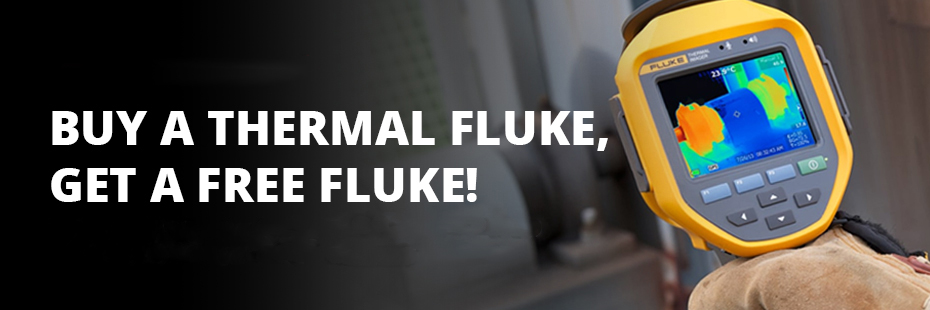 Buy an eligible Fluke thermal camera between the 1st September 2023 and the 15th December 2023 and you’ll receive a free Fluke tool of your choice. Boost your thermal camera purchase this autumn with Fluke!
Continue reading →
Buy an eligible Fluke thermal camera between the 1st September 2023 and the 15th December 2023 and you’ll receive a free Fluke tool of your choice. Boost your thermal camera purchase this autumn with Fluke!
Continue reading → -
Thermal Imaging Technology Used to Tackle Wildfires
 Sadly, news reports detailing the devastating effects of extreme weather are becoming more frequent. This year is no different. So far in 2023, Europe has experienced severe flooding in Italy’s Emilia-Romagna region, followed by intense heat across the Mediterranean. Predictably, extreme heat turned into devastating wildfires which led to evacuation missions across Greece, Portugal, and Italy (to name just a few countries). With experts assuring us that extreme weather will become more frequent due to climate change[1], finding methods to address or prevent its consequences, such as forest fires, is critical. For years, domestic fires have been tackled using thermal imaging technology; now, thermal cameras are preventing and stopping wildfires.
Continue reading →
Sadly, news reports detailing the devastating effects of extreme weather are becoming more frequent. This year is no different. So far in 2023, Europe has experienced severe flooding in Italy’s Emilia-Romagna region, followed by intense heat across the Mediterranean. Predictably, extreme heat turned into devastating wildfires which led to evacuation missions across Greece, Portugal, and Italy (to name just a few countries). With experts assuring us that extreme weather will become more frequent due to climate change[1], finding methods to address or prevent its consequences, such as forest fires, is critical. For years, domestic fires have been tackled using thermal imaging technology; now, thermal cameras are preventing and stopping wildfires.
Continue reading → -
International Cat Day: Thermal Camera Used to Rescue Kittens
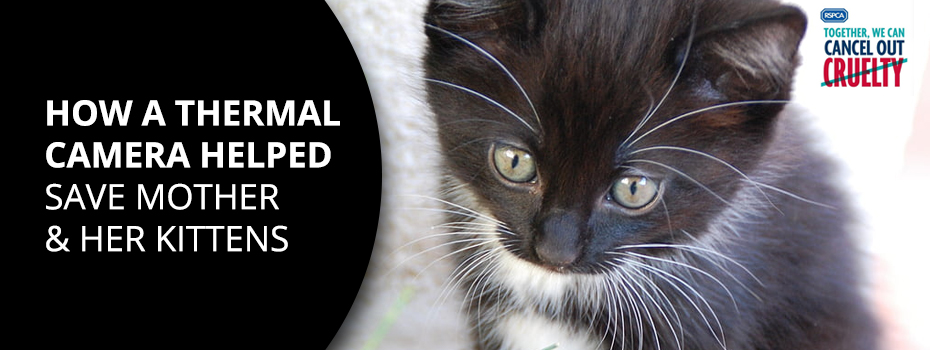 It’s International Cat Day – one of the cutest days of the year! In a recent blog, we demonstrated how thermal imaging cameras ensure swift, safe, and simple bee removal. However, did you know thermal imagers also play a critical role in animal rescue missions? July 2023 saw the dramatic rescue of a cat and her five kittens from a house in Harrow, London. Together, RSPCA animal rescue offers (AROs), Jade Guthrie and Holly Walker, and the London Fire Brigade used thermal imaging to locate and remove six felines from a loft.[1]
Continue reading →
It’s International Cat Day – one of the cutest days of the year! In a recent blog, we demonstrated how thermal imaging cameras ensure swift, safe, and simple bee removal. However, did you know thermal imagers also play a critical role in animal rescue missions? July 2023 saw the dramatic rescue of a cat and her five kittens from a house in Harrow, London. Together, RSPCA animal rescue offers (AROs), Jade Guthrie and Holly Walker, and the London Fire Brigade used thermal imaging to locate and remove six felines from a loft.[1]
Continue reading → -
Teledyne FLIR Rewards: Buy a FLIR Get a FREE FLIR
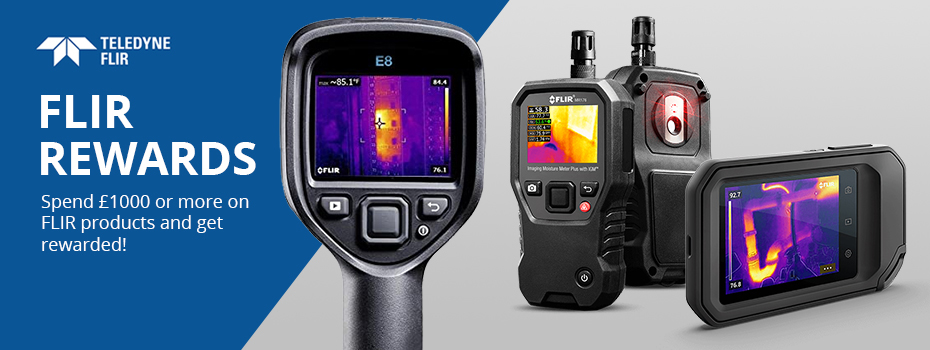 When you spend £1000 or more on qualifying Teledyne FLIR products between the 1st July and 31st December 2023, you’ll receive a FREE Teledyne FLIR tool of your choice (UK & EU customers only, T&Cs apply).
Continue reading →
When you spend £1000 or more on qualifying Teledyne FLIR products between the 1st July and 31st December 2023, you’ll receive a FREE Teledyne FLIR tool of your choice (UK & EU customers only, T&Cs apply).
Continue reading → -
Bee Removal: 5 Things You Need to Know About Using Thermal Imaging for Pest Control
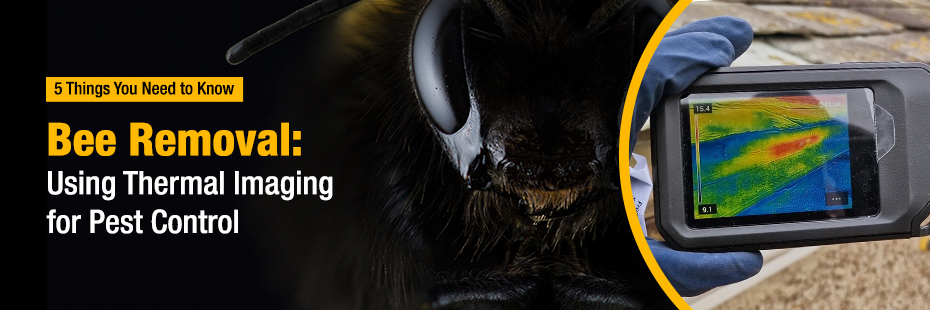 You know, as a pest control specialist, that bee, rodent, or insect removal can be time-consuming, invasive, and expensive. We know this too. However, we also know about an innovative solution... thermal imaging. Thermal imaging cameras, such as the handheld Teledyne FLIR C5, quickly detect the heat emitted by pests. This means you can precisely pinpoint nest locations. Consequently, targeting extraction methods become much simpler, which in turn limits damage, saves time, and reduces costs.
Continue reading →
You know, as a pest control specialist, that bee, rodent, or insect removal can be time-consuming, invasive, and expensive. We know this too. However, we also know about an innovative solution... thermal imaging. Thermal imaging cameras, such as the handheld Teledyne FLIR C5, quickly detect the heat emitted by pests. This means you can precisely pinpoint nest locations. Consequently, targeting extraction methods become much simpler, which in turn limits damage, saves time, and reduces costs.
Continue reading →


